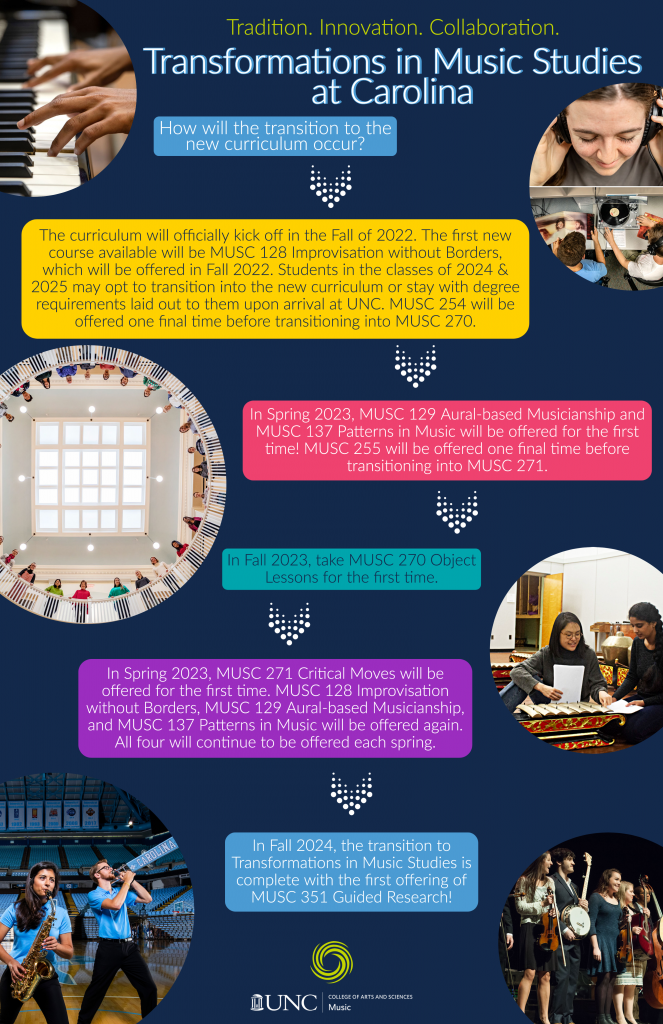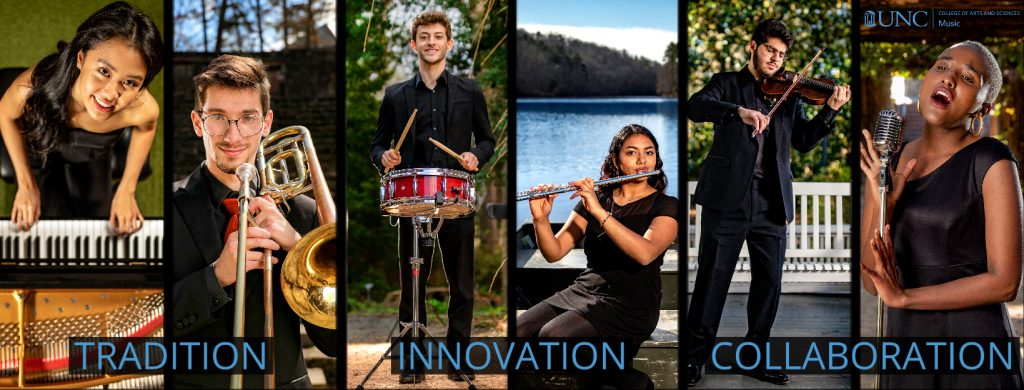Transformations in Music Studies at Carolina

Transform your music studies via our new degree programs for the Bachelor of Arts, Bachelor of Music, and Minor.
Conquer your scholarship and performance goals with our revitalized catalog of courses.
Study and perform bluegrass, experimental, hip hop, jazz, opera, popular music, western art music, and more from across the globe.
Welcome to the homepage of the new undergraduate music curriculum at Carolina! The Department of Music offers Carolina students a broad, substantive, and welcoming educational experience. Any student who wants a life in music or music in their life can find the degree path —Bachelor of Arts in Music (B.A.), Bachelor of Music (B.Mus.), and Minor in Music— to meet their artistic and academic needs. On this page, explore our new offerings, discover new possibilities in musical studies, and get all your questions answered.
At UNC, music students explore the histories, cultural contexts, and meanings of music and learn varying modes and methods of music creation, communication, and dissemination. They also develop analytical and performance skills in traditions including bluegrass, experimental, hip hop, jazz, opera, popular music, western art music, and more from across the globe. The study of music in our department also complements students’ work in other humanities, social, and natural sciences disciplines.
We understand the need for twenty-first-century musicians to be conversant across multiple styles and practices and familiar with disparate geographic and historical traditions. As a music major or minor, you’ll explore the significance, cultural diversity, and intellectual richness of music traditions across historical and cultural contexts. At the same time, your artistic, intellectual, and technological curiosities will be refined, helping you create, investigate, and/or perform music at the highest collegiate level.
Are you…
- an incoming or prospective music student?
- a current student?
- wondering how your credits will transfer to the new curriculum?
- seeking information on the new requirements?
- excited to discover what some of the new courses will be?
- looking for a timeline of the curriculum transition?
- curious about what will happen if you don’t switch your degree plan to the new curriculum?
- searching for answers to other questions?
Navigating Music Studies at Carolina
Current Students
“I’m a junior music major. What does this mean for my senior year?”
While you’ll have the opportunity to participate in a couple of new courses next year, if you so choose, your degree requirements will not be affected by the new curriculum.
“I’m a first-year/sophomore music major. What does this mean for me?”
First-year and sophomore music students have the option to be transitioned into the new curriculum program. This new curriculum will include new courses and requirements, but this transition won’t be made overnight.
Current music majors who opt to transition to the new degree program must have their “requirement term” changed in ConnectCarolina for their degree audit to be updated. This process generally requires the student to meet with their Academic Advisor.
Some key things you should know now are:
- All of the existing pathways are still there. If you’re currently studying it, you can keep studying it. No areas, ensembles, or lessons are being cut – this new curriculum is an expansion!
- There will be more flexibility in which ensembles count towards degree requirements. All 211 and 212 ensembles will now count towards the ensemble degree requirement!
- MUSC 128 Improvisation without Borders, taught by Professor Allen Anderson, is the first new curriculum course to reach the classroom and it will be open this fall. Register for it this spring while space is available!
- We’ll be welcoming new faculty members over the next couple of years to teach these exciting new areas of study! Stay tuned!
What does this mean for the credits you’ve already acquired?
They’ll transfer into the equivalent of the new curriculum! See how below.
- First-year B.Mus. students will count the following courses toward requirements in the new B.Mus. degree program: MUSC 120, MUSC 254 (for 270), MUSC 255 (for 271), MUSC 131, MUSC 130, MUSC 133, “Global Music” courses (for ensemble requirement, theory elective, or general elective), MUSC 200-207 (for lessons), MUSC 100/135/136/200/236 (for keyboard skills), MUSC 211/212 (for ensembles)
- First-year B.A. students will count the following courses toward requirements in the new B.A. degree program: MUSC 120, MUSC 254 (for 270), MUSC 255 (for 271), MUSC 131 (for theory elective), MUSC 130, “Global Music” courses (for ensemble requirement, theory elective, or general elective), MUSC 100-107/200207 (for lessons), MUSC 211/212 (for ensembles)
- Second-year B.Mus. students will count the following courses toward requirements in the new B.Mus. degree program: MUSC 120, MUSC 254 (for 270), MUSC 255 (for 271), MUSC 131, MUSC 132 (for theory elective), MUSC 232 (for theory elective), MUSC 130, MUSC 133, MUSC 230 (for elective), “Global Music” courses (for ensemble requirement, theory elective, or general elective), MUSC 200-207 (for lessons), MUSC 100/135/136/200/236 (for keyboard skills), MUSC 211/212 (for ensembles)
- Second-year B.A. students will count the following courses toward requirements in the new B.A. degree program: MUSC 120, MUSC 254 (for 270), MUSC 255 (for 271), MUSC 131 (for theory elective), MUSC 132 (for theory elective), “Global Music” courses (for ensemble requirement, theory elective, or general elective), MUSC 100-107/200-207 (for lessons), MUSC 211/212 (for ensembles)
What are the new requirements for this new curriculum plan?
The biggest changes in the curriculum are an expansion of course offerings and available pathways. This includes expanding the theory and musicianship offerings to include more about non-tonal and non-Western notated music. The history courses (MUSC 254 and 255) are also seeing a big change. These courses will now be MUSC 270 Object Lessons and MUSC 271 Critical Moves. These courses on how to research and talk about musics from around the globe will feed into the culminating, seminar-style MUSC 351 Guided Research. Learn more about all of these new courses in the following section.
The other big change is the new requirement of a senior presentation/recital for B.Mus. degree candidates.
What are some of the new courses the new curriculum will bring?
The first new course to be offered as part of the Transformations curriculum is MUSC 128 Improvisation without Borders, taught by Professor Allen Anderson. This new required course (for both the B.A. and B.Mus.) is a practical exploration of musical improvisation. There are no prerequisites, as it is intended for students from any musical background interested in improvised performance.
Using the techniques and principles derived from improvisational music and theater, students will develop their creativity, communication, and collaborative skills. Students will work to develop an individualized sound palette, explore close listening through exercises and directed group improvisation utilizing time/rhythm, drones, embellished melodies or melodic fragments, cadenzas, and other improvisational techniques from pop, folk, jazz, and musical traditions around the globe.
Other new courses planned include:
- MUSC 129 Aural-based Musicianship (1 credit)
- No prerequisites (can be taken before any theory courses). Explores how the human brain hears patterns in pitch and time. Does not rely on western musical notation.
- Coming Spring 2023
- Music 137 Patterns in Music (3 credits)
- Introduction to music theory—defined as an examination of the underlying patterns deployed by composers, performers, and listeners in creating and comprehending music within a style—for students whose primary interest is in popular music and whose background is primarily aural and/or outside of the notational practices of Western art music.
- Coming Spring 2023
- MUSC 270 Object Lessons (3 credits)
- Learn to gather and evaluate data on music from a variety of sources, both visual (print, online, images, etc.) and aural (performances, oral testimony, etc.), and how to distinguish between primary and secondary sources. Explore critical approaches to the study of musical transmission (including notation, editions, oral transmission), as well as the study of music as mediated (recordings, performance studies, critical approaches to pedagogy).
- Coming Fall 2023
- MUSC 271 Critical Moves (3 credits)
- Learn to articulate key issues raised by understanding music (1) as a human activity, including questions of embodiment, (dis)ability, difference, and power, and (2) as a part of society, systems of knowledge production (music theory), and history (including questions of identity, politics, community, technology, etc.). Discover how to formulate research questions about music and be guided toward independent research skills in collaboration with the UNC libraries.
- Coming Spring 2024
- MUSC 351 Guided Research (3 credits)
- This required, research-based course draws on the skills developed in the previous two semesters (MUSC 270 and 271). It is a stepping stone toward an honors thesis and an opportunity for music majors to have a seminar-like experience (max. 15 students). Study in this course results in an original research paper on a topic of the student’s own development, and oral presentations of the same.
- Coming Fall 2024
When will all of these changes take place?

What if I choose not to transition to the new curriculum plan?
Current first-year and sophomore students are allowed to finish their degrees in the current curriculum program. To aid in the completion of these degrees:
- In 2022–23 the department will offer the following existing and required courses: MUSC 254 and MUSC 255 (for both B.Mus. and B.A. students)
- In 2023–24 the new courses MUSC 270 and MUSC 271 will substitute for MUSC 254 and MUSC 255, respectively. All remaining required courses for the current B.Mus. and B.A. degree programs will continue to be required or meet elective requirements in the new degree programs.
View a sample Transformations in Music Studies Academic Plan.
Bachelor of Arts in Music (35 hours)
Bachelor of Music (64 hours)
View the new curriculum requirements here.
New & Prospective Music Students

View a sample Transformations in Music Studies Academic Plan.
Bachelor of Arts in Music (35 credit hours)
Bachelor of Music (64 credit hours)
View the new curriculum requirements here.
INCOMING STUDENTS: Be sure to check out this page for important dates and information needed to begin the academic year!
Frequently Asked Questions
How does the new music curriculum fit in with the new Ideas in Action general education curriculum?
Transformations in Music Studies complements the IDEAS in Action general education curriculum through skills-based approaches to music study. Some of the overlapping learning goals include the “Ways of Seeing and Knowing” (Modes of Seeing and Knowing; Knowledge of the Human Past; Global Understanding and Engagement; Power, Difference, and Inequality; Aesthetic and Interpretive Analysis; Active Research Involvement; Upper-Level Communication Intensive) and “Creative Expression, Practice, and Production” Focus Capacities.
How many music credit hours are required to complete each degree?
The department credit hours required to complete each degree program in music are:
- Bachelor of Arts: 35 credit hours
- Bachelor of Music: 64 credit hours
- Minor in Music: 15 credit hours
Do I need to have studied music before studying music at Carolina?
No! Music studies are open to all students at UNC. However, auditions are required for some ensembles and lessons (for placement). Also, the Music Theory Diagnostic Test is required for all new students looking to be placed in a music theory course.
Can I become a music major after my first year at UNC?
Yes! It is not necessary to declare your major as music in the first year. However, it is recommended that if you’re considering majoring in music, take MUSC 120 and a lesson and ensemble. The Bachelor of Music requires eight semesters of lessons and ensembles, so if you’re contemplating this degree course you must begin these your first semester to stay on track for graduation in four years.
So, how many semesters of lessons and ensembles do I need to take?
The Bachelor of Arts requires:
- 2 semesters of lessons,
- 4 semesters of ensembles.
The Bachelor of Music requires:
- 8 semesters of lessons,
- 8 semesters of ensembles.
I don’t want to study classical music. Is there a space for me?
Yes! Interested in hip hop or bluegrass for example? The department offers private lessons and ensembles in both. The new and redesigned theory and history courses will also be more applicable to non-Western classical music studies as well.
Still have questions? Reach out to us at music@unc.edu!

“The culture of a research-intensive university like ours guarantees that course offerings and major programs change frequently, reflecting the dynamic nature of our faculty’s work.”
